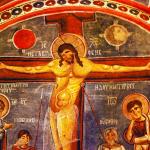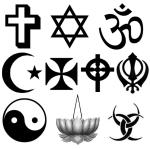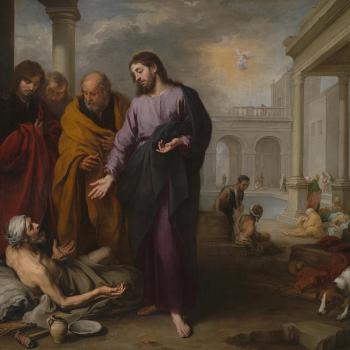
Christian teaching is the doctrine of love. It presents to us the incarnation, showing us how the God who is love is revealed to us in and through Jesus Christ. Despite sin, despite all that humanity has done, God did not stand apart from humanity, but came amongst it, indicating that God, despite the transcendence of the divine nature, is immanent with us. God is no isolationist, and neither should we be. We are meant to follow the path of love set up by Jesus. We are to be with the people of the world instead of setting up communities which isolate us from them. We are meant to take the grace which we have been given and share it with the world. We are not meant to keep it away from those who need it, but rather, we are to find the means by which we can share it with them.
If we set up communities so as to keep our distance from others, from those who we deem to be sinners, we no longer follow the example of the incarnation. It should not be surprising that we end up becoming so attached to ourselves and the rules set up to establish the community we enter. In such communities, the way of life becomes very legalistic, engaging rules which know no mercy or grace, so that we find the praxis of such communities is far from what Christ would have us do. This is why we find people in such communities losing the love which they are meant to have, replacing it with legalistic expectations; though they might, through external forms of piety established by such legalism, have an appearance of holiness about the, in reality, because they have rejected love and the grace which flows from it, they hide by their pretense all kinds of sin, including and establishing systematic structures of sin which end up hurting not only those outside of the community, but those within it as well.
Christians, therefore, need to avoid the trap which would have them take on the name of Christ while ignoring what he taught. The message of Christ is the message of love. It is not isolationist. It is not legalistic. Christ came into the world to save it, not to judge or condemn it. Sadly, those who engage communitarian isolationism judge and condemn the world to justify their isolation, and so they end up ignoring the world and the role they should have in it. They have lost sight of love, and without that love, they are nothing (cf. 1 Cor. 13:2).
Christian renewal can only be had if and when we realize our focus should be love. The communities which we form should be communities of love, communities, therefore, which open themselves to others, sharing the love and grace which they have received to the rest of the world. Catherine de Huek Doherty expressed this point throughout her writings; she saw Christians must by transformed by love that through such love, they could be the leaven which transforms the world:
Love is the only answer, and it has to start in the mind and heart of each person. Only then will it be effective. Then the whole world will enter into its springtime, the storms will be hushed, and peace will reign among us … [1]
She made it clear, if there is to be talk about Christian renewal, the focus should be on love. Sadly, so many Christians have lost such love as they follow the faith only for selfish considerations, for what they think they can get out of it for themselves. Instead of sharing the blessings they have received from God with others, they try to fence it up and keep it for themselves alone, as if there were not enough grace for all. But all this does is strangle grace and have them lose the grace which they try to possess. Thus, they need renewal, renewal which will transform them and have them engage the world in and through love, and if they allow this to happen, then they will be able to become reflections of the Trinity in the world:
Where should renewal lead first and foremost? It ought to lead Christians to become a community of love. God said, “It is not right that man should be alone” (Gen. 2:18). God knew about communities of love. The first and eternal community of love is the Most Holy Trinity. Each individual Christian has first to become part of their communion of love, part of the Trinity. We are called to incarnate this union in daily life. Then, each of us can form a community of love with everyone we meet. Other people may be strangers to us, but a stranger is simply a friend I haven’t met yet. Friendship is the fruit of love. [2]
We must not isolate ourselves from the world; we must love the world and the people in it. This does not mean, of course, we love the terrible condition we find the world in as a result of all the sin and hatred which exists in it. Rather, because we love the world, we want to help heal it from the wounds of sin. Dorothy Day understood this, which is why she made it clear that her ideals, her special pacifistic expression of the faith, was not meant to suggest isolationism of any kind: “I do not believe in being isolationist. I believe that we must hold ourselves in readiness to help with all our resources exhausted nations.”[3]
We are called to embrace love and make it a part of who we are. Christians should be known by their love, not only the love which they have for each other, but the love which they have for all. Sadly, this radical love has been rejected by many, if not most, Christians today. Instead of following the example of Christ, giving of themselves to the world through love, Christians seek only their own gain. They have become very self-centered, even in their spirituality, and because of this, they have lost much of what the Christian faith is about. This is why so many of us need to change, to take up the cross, and by it, turn away from our selfishness so that we can once again love others as we should: “We are called to undergo a metanoia, a change of heart, an emptying of the self, so that the divine light that comes through unity with the Holy Trinity may flow through us and draw others into that light.” [4] When we fail to do this, we should not be surprised that our actions and our words, far from bringing people to the faith, turn them away. When Christians do not form communities of love, if they do not reflect the Trinity as they should, it should not be surprising that many Christians who are looking for such love will become confused and wonder about the truth of the Christian faith. Of course, their doubts, their confusion, comes out of their understanding that things are not as they should be, an understanding which reveals they have an innate desire and understanding for the Christian faith as it should be, a faith guided by love. Thus, those who find their faith shaken because of the way love and its principles have been rejected by Christian communities are not wrong in their expectations; they are right and when Christians, especially those in positions of authority do not follow through with such love, they are right to speak out. For such people are speaking out, showing us how far we are from the authentic to the teachings of Christ. Their voice, their confusion, should demonstrate the need for Christians to engage renewal, the renewal of love. If Christians follow through with love, and act on that love, then they will be able to show the world how Christianity is a faith which moves mountains, that is, a faith which moves people to love and act for and promote the common good thanks to that love. Then, we will find Christians will attract others to the faith, not through theological disputes, but through love itself, For, as Ficino suggested, love is what gives birth to faith:
Grace moves Love. Love begets Faith. Faith embraces her father Love, and through the heat of this embrace, By Love gives birth to Friendship. Then Faith feeds this infant Friendship, allowing her to grow daily, and completely protecting her from destruction. [5]
[1] Catherine de Hueck Doherty, “Love, Who is God, Is The Only Answer” in Essential Writings. Selected and introduced by David Moconi, SJ (Maryknoll, NY: Orbis Books. 2009, 92.
[2] Catherine de Hueck Doherty, “Unity in the Trinity” in Essential Writings. Selected and introduced by David Moconi, SJ (Maryknoll, NY: Orbis Books. 2009), 64.
[3] Dorothy Day, “Letter To Bob Walsh. May 3, 1940” in All The Way To Heaven: The Selected Letters of Dorothy Day. Ed. Robert Ellsberg (New York: Image Books, 2010), 147..
[4] Catherine de Hueck Doherty, “Unity in the Trinity,” 64.
[5] Marsilio Ficino, The Letters of Marsilio Ficino. Volume 1. trans. by members of the Language Department of the School of Economic Science, London (London: Shepheard-Walwyn, 1975; repr. 1988), 102 [Letter 56 to Naldo Naldi].
Stay in touch! Like A Little Bit of Nothing on Facebook.
If you liked what you read, please consider sharing it with your friends and family!













